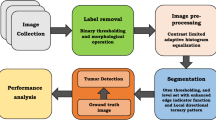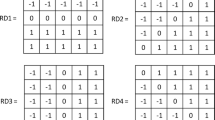Abstract
Automatic segmentation of the liver and the Lesion detection can be a very challenging task due to its variability in size, shape, position and the presence of other organs with similar intensities. Manual segmentation and detection of a tumor is a time-consuming task and greatly depends upon the expertise and experience of the physician. We proposed a method which consists of automatic segmentation and detection of liver and lesion using CT scan modality. H-minima transform filter, Otsu global thresholds, Morphological opening by reconstruction and modified Connected Component Labeling algorithms are applied for liver segmentation. To keep the technique simple and effective, an appropriate range of threshold values are defined to detect different types of lesions. Performance of the proposed system is evaluated and compared with the state-of-the art algorithms. The results of the comparison show that the proposed approach is robust and efficient due to its simplicity. The dice coefficient score for the hepatic segmentation is 94% while sensitivity and specificity for hepatic lesion are 93% and 87% respectively.
















Similar content being viewed by others
References
Abdel-massieh NH (2012) Fully automatic technique for liver segmentation from abdominal CT scan with knowledge-based constraints. INTECH Open Access Publisher
Altarawneh NM, Luo S, Regan B, Sun C (2015) A modified distance regularized level set model for liver segmentation from ct images. Signal Image Process 6(1):1
Anter AM, Azar AT, Hassanien AE, El-Bendary N, ElSoud MA (2013) Automatic computer aided segmentation for liver and hepatic lesions using hybrid segmentations techniques. In: 2013 federated conference on computer science and information systems (FedCSIS). IEEE, pp 193–198
Ashraf R, Ahmed M, Ahmad U, Habib MA, Jabbar S, Naseer K (2018) Mdcbir-mf: multimedia data for content-based image retrieval by using multiple features. Multimed Tools Appl, 1–27
Ashraf R, Ahmed M, Jabbar S, Khalid S, Ahmad A, Din S, Jeon G (2018) Content based image retrieval by using color descriptor and discrete wavelet transform. J Med Syst 42(3):44
Belgherbi A, Hadjidj I, Bessaid A (2014) A semi-automated method for the liver lesion extraction from a ct images based on mathematical morphology. J Biomed Sci 2(2)
Candemir S, Jaeger S, Palaniappan K, Musco JP, Singh RK, Xue Z, Karargyris A, Antani S, Thoma G, McDonald CJ (2014) Lung segmentation in chest radiographs using anatomical atlases with nonrigid registration. IEEE Trans Med Imag 33(2):577–590
Ciecholewski M (2014) Automatic liver segmentation from 2d ct images using an approximate contour model. J Signal Process Syst 74(2):151–174
Ding X, Geng X, Jiang C, Tian F, Yan X, Qi H, Zhang L, Zheng Y (2016) Fast automated liver delineation from computational tomography angiography. Procedia Comput Sci 90:87–92
Goryawala M, Guillen MR, Cabrerizo M, Barreto A, Gulec S, Barot TC, Suthar RR, Bhatt RN, Mcgoron A, Adjouadi M (2012) A 3-d liver segmentation method with parallel computing for selective internal radiation therapy. IEEE Trans Inf Technol Biomed 16(1):62–69
Huang S, Wang B, Huang X (2006) Using gvf snake to segment liver from ct images. In: 3rd IEEE/EMBS international summer school on medical devices and biosensors, 2006. IEEE, pp 145–148
Jamil U, Khalid S, Akram MU, Ahmad A, Jabbar S (2018) Melanocytic and nevus lesion detection from diseased dermoscopic images using fuzzy and wavelet techniques. Soft Comput 22(5):1577–1593
Jemal A, Bray F, Center MM, Ferlay J, Ward E, Forman D (2011) Global cancer statistics. CA: Cancer J Clinicians 61(2):69–90
Jiang H, Cheng Q (2009) Automatic 3d segmentation of ct images based on active contour models. In: 11th IEEE international conference on computer-aided design and computer graphics, 2009. CAD/Graphics’ 09. IEEE, pp 540–543
Kumar S, Moni R, Rajeesh J (2011) Automatic segmentation of liver and tumor for cad of liver. J Adv Inf Technol 2(1):63–70
Level Otsu N (1979) A threshold selection method from gray-level histogram. IEEE Trans Syst Man Cybern 9(1):62–66
Massoptier L, Casciaro S (2007) Fully automatic liver segmentation through graph-cut technique. In: 29th annual international conference of the IEEE engineering in medicine and biology society, 2007. EMBS 2007. IEEE, pp 5243–5246
Massoptier L, Casciaro S (2008) A new fully automatic and robust algorithm for fast segmentation of liver tissue and tumors from ct scans. Europ Radiol 18(8):1658
Militzer A, Hager T, Jager F, Tietjen C, Hornegger J (2010) Automatic detection and segmentation of focal liver lesions in contrast enhanced ct images. In: 2010 20th international conference on pattern recognition (ICPR). IEEE, pp 2524–2527
Moghbel M, Mashohor S, Mahmud R, Saripan MIB (2016) Automatic liver tumor segmentation on computed tomography for patient treatment planning and monitoring. EXCLI J 15:406
Obayya M, El Rabaie S (2015) Automated segmentation of suspicious regions in liver ct using fcm. Int J Comput Appl 118(6)
Suzuki K, Kohlbrenner R, Epstein ML, Obajuluwa AM, Xu J, Hori M (2010) Computer-aided measurement of liver volumes in ct by means of geodesic active contour segmentation coupled with level-set algorithms. Med Phys 37(5):2159–2166
Vincent L (1993) Morphological grayscale reconstruction in image analysis: applications and efficient algorithms. IEEE Trans Image Process 2(2):176–201
Wu W, Zhou Z, Wu S, Zhang Y (2016) Automatic liver segmentation on volumetric ct images using supervoxel-based graph cuts. Computational and Mathematical Methods in Medicine, 2016
Yussof WNJHW, Burkhardt H (2010) Integration of morphology and graph-based techniques for fully automatic liver segmentation. Majlesi J Electr Eng 4(3):59–66
Zafar B, Ashraf R, Ali N, Ahmed M, Jabbar S, Naseer K, Ahmad A, Jeon G (2018) Intelligent image classification-based on spatial weighted histograms of concentric circles. Comput Sci Inf Syst, 15(3)
Zidan A, Ghali NI, ella Hassamen A, Hefny H (2012) Level set-based ct liver image segmentation with watershed and artificial neural networks. In: 2012 12th international conference on hybrid intelligent systems (HIS). IEEE, pp 96–102
Author information
Authors and Affiliations
Corresponding author
Additional information
Publisher’s note
Springer Nature remains neutral with regard to jurisdictional claims in published maps and institutional affiliations.
Rights and permissions
About this article
Cite this article
Khan, N., Ahmed, I., Kiran, M. et al. Automatic segmentation of liver & lesion detection using H-minima transform and connecting component labeling. Multimed Tools Appl 79, 8459–8481 (2020). https://doi.org/10.1007/s11042-019-7347-4
Received:
Revised:
Accepted:
Published:
Issue Date:
DOI: https://doi.org/10.1007/s11042-019-7347-4




